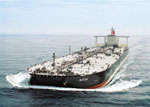 Reuters: An Iranian tanker is moored at Royal Dutch Shell’s Singapore refinery to discharge crude oil, according to Reuters data and sources, highlighting the different approaches European oil companies are taking to Iranian oil ahead of an EU ban. By Francis Kan
Reuters: An Iranian tanker is moored at Royal Dutch Shell’s Singapore refinery to discharge crude oil, according to Reuters data and sources, highlighting the different approaches European oil companies are taking to Iranian oil ahead of an EU ban. By Francis Kan  SINGAPORE, March 2 (Reuters) – An Iranian tanker is moored at Royal Dutch Shell’s Singapore refinery to discharge crude oil, according to Reuters data and sources, highlighting the different approaches European oil companies are taking to Iranian oil ahead of an EU ban.
SINGAPORE, March 2 (Reuters) – An Iranian tanker is moored at Royal Dutch Shell’s Singapore refinery to discharge crude oil, according to Reuters data and sources, highlighting the different approaches European oil companies are taking to Iranian oil ahead of an EU ban.
The 270,000-tonne supertanker Delvar arrived on Thursday at Bukom island, where Shell’s 500,000 barrel-per-day (bpd) refinery is located, tanker tracking data seen by Reuters showed.
The vessel, part of the fleet of the National Iranian Tanker Co, is due to discharge 1.5 million barrels of crude, three sources said on Friday. Oil traders had speculated Tehran was struggling to sell the cargo due to tightening sanctions.
“Yes, Shell bought it. There is no other reason for it to be anchored at Bukom,” said a Singapore-based ship broker.
Shell’s continued involvement in Iranian oil contrasts with some rivals such as Total, which have already stopped buying the crude ahead of the European Union ban starting from July 1. With the ban yet to take effect, Shell is doing nothing illegal.
“Shell is usually more pragmatic,” said a trading source at a European oil company. “I would not be surprised if they continued to lift a little bit until it becomes illegal to do so.”
The Anglo-Dutch company said: “We do not comment on our trading activities. Shell complies with all applicable sanctions.”
Western sanctions, aimed at pressuring Iran over its nuclear programme, are hampering Iran’s ability to sell its crude oil,
which generates most of the country’s foreign exchange earnings.
Washington will impose sanctions from June 28 on companies facilitating Iran’s oil trade, but many companies are already
preparing for the deadline.
In the latest evidence that the sanctions threat is disrupting Iran’s trade, industry sources said Shipping Corp of India was forced last month to cancel at least one Iranian crude shipment because it could not secure insurance cover for the vessel.
Tehran’s Japanese customers are seeking the inclusion of force majeure clauses in term supply contracts with Iran in case
they are unable to pay or transport cargoes in the future, industry sources said.
Japan, China and India are Iran’s top crude buyers, taking about 45 percent of Iran’s 2.6 million barrels per day (bpd) of
exports.
SPECULATION
The Delvar arrived on Feb. 23 off Indonesia’s Karimun Island, an offshore storage point near the oil-trading hub of
Singapore that is often used for ship-to-ship transfers (STS).
The arrival sparked speculation in oil markets that the cargo was crude that Iran had been unable to sell elsewhere because of the sanctions. Local oil traders said NITC vessels have not been known to call at Karimun Island in the past.
The Delvar moved into Singapore waters on Feb. 26 after discharging a cargo of condensate into a smaller, China-bound
tanker.
The 60,000-tonne vessel, Xuan Wu Hu, was bound for an oil complex in Huizhou, where China National Offshore Oil Corp
(CNOOC) and Shell jointly operate a petrochemical complex.
Industry source say Shell takes around 100,000 bpd of Iranian crude into Europe and a similar quantity into Japan under a deal with Japanese company Showa Shell that expires in March.
Shell Chief Executive Peter Voser declined to detail Shell’s Iranian crude purchases when speaking on Feb. 2 in a company
earnings briefing.
“Shell will comply with the sanctions and we will therefore get our crude from somewhere else,” Voser said.
Singapore imported around 20,000 bpd of Iranian crude over the past year, industry estimates show. Official data on Iranian imports to Singapore is not available.
Shell’s Bukom refinery, the oil major’s largest, makes up the biggest share of this volume, industry sources said.


